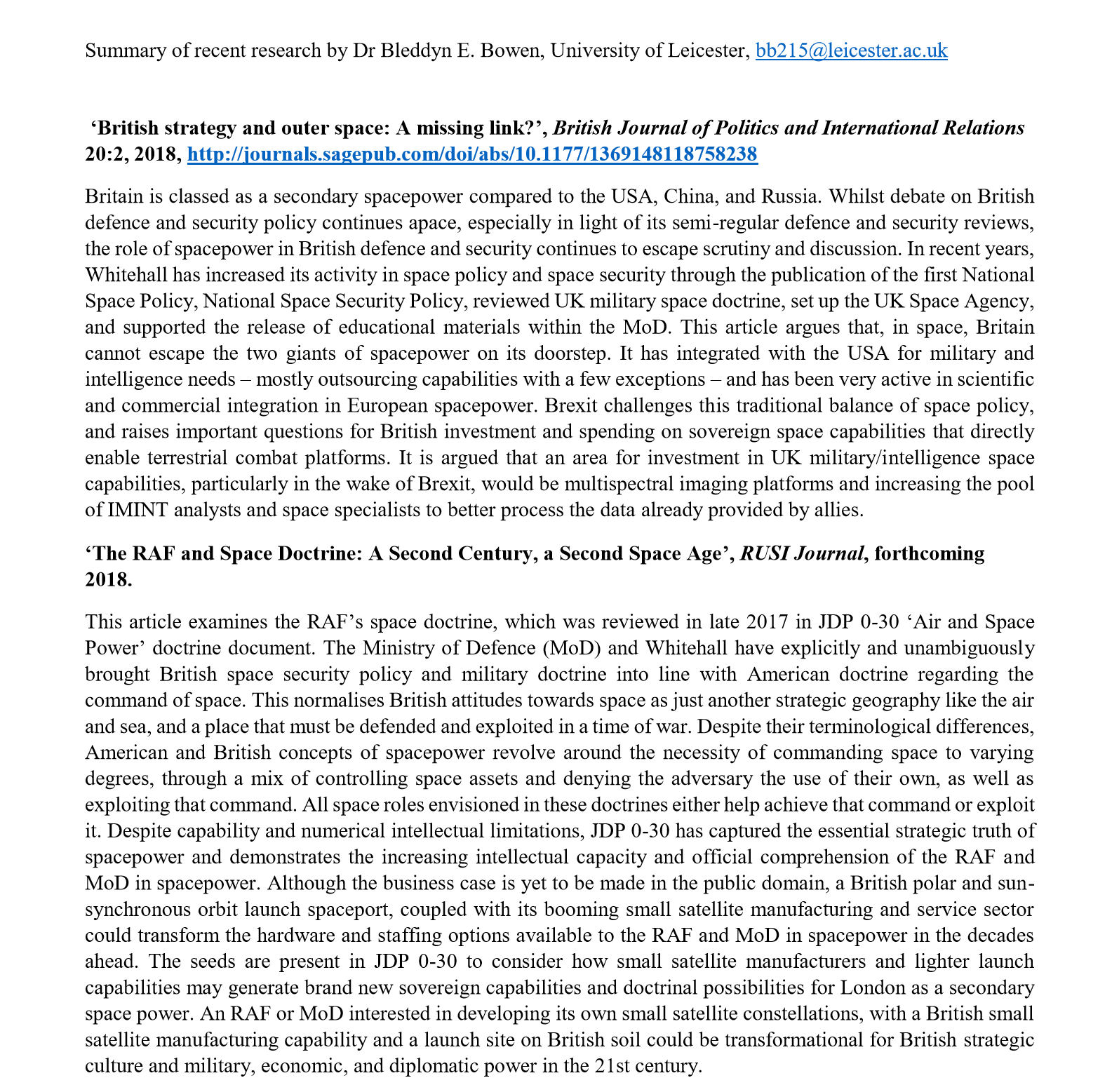SMA Space Panel- UK Perspectives
SMA hosted a panel with Dr. Bleddyn Bowen (University of Leicester), Dr. Mark Hilborne (King’s College, London), and Dr. Nicholas Wright (Intelligent Biology / Georgetown University) as part of its SMA Contested Space Operations: Space Defense, Deterrence, and Warfighting (Space) Speaker Series.
Date: 17 May 2018
Speaker Session Preview
SMA hosted a panel discussion as a part of its SMA Space Speaker Series. The panelists for this session included Dr. Bleddyn Bowen (University of Leicester), Dr. Mark Hilborne (King’s College London), and moderator Dr. Nicholas Wright (Intelligent Biology; Georgetown University). Dr. Bowen first provided an overview of UK government and commercial space capabilities. He then explained the ways in which UK space doctrine is similar to that of the US and discussed how the UK has somewhat limited capabilities in space and is highly reliant on the US. Dr. Hilborne spoke about how UK doctrine on counter-space capabilities is very limited and how the Ministry of Defence (MOD) is hesitant to talk about space conflict and escalation management. The two panelists also offered their insights on how the UK would react to an American hostile action in space, and how the UK views kinetic and non-kinetic actions in space.
This panel supported SMA’s Contested Space Operations: Space Defense, Deterrence, and Warfighting (Space) project. For additional speaker sessions and project publications, please visit the Space project page.
Speaker Session Recording
Briefing Materials
Biographies
Dr Bleddyn Bowen is a Lecturer in International Relations at the University of Leicester. Before lecturing at Leicester in January 2018, he was a Lecturer in Defence Studies at the Defence Studies Department, King’s College London, which is embedded at the Joint Services Command and Staff College, Shrivenham. Prior to that, he was a Teaching Fellow at the Department of International Politics, Aberystwyth University, where he also worked for his various degrees. During his PhD at Aberystwyth University he was a Visiting Scholar at the Space Policy Institute in Washington, D.C. in Spring 2014. Bleddyn’s primary research interests concern warfare, politics, and security in outer space. Bleddyn has published in several academic journals and has written numerous op-eds for various outlets, provided evidence for the UK’s House of Commons Exiting the EU Select Committee on Brexit and UK space policy, and has appeared in the media several times in outlets such as BBC Radio 4, 5, Wales, Cymru, the Financial Times, The Times (London), and Wired. Bleddyn is currently working on his research monograph, about space power theory
Dr. Mark Hilborne is a lecturer at the Defence Studies Department at King’s College London, based at the Defence Academy. Dr Hilborne also runs the War Studies Online Air Power in the Modern World MA. He has also taught at RAF Cranwell, again as part of King’s, where he was Assistant Head of Air Power Studies, and at the University of Birmingham within the Department of Political Science and International Studies (POLSIS). Dr Hilborne also was a visiting Researcher at the United Nations Institute of Disarmament where he focused principally on space security issues. He was the academic director of the RAF Intermediate Command and Staff Course for a number of years and serves on the Editorial Board of RAF Air Power Review. Dr Hilborne has set up the Space Security Research Group, and he is currently supervising three PhDs in this field. His research focuses on nuclear proliferation and deterrence, space security and more recently hypersonic strategic weapons systems and their impact on nuclear deterrence. Dr Hilborne holds a BA from the University of British Columbia (UBC), and an M.Phil and PhD from Cambridge University. His latest research includes Beyond the Earth, beyond the state: NewSpace and Space Security, which is planned as part of a forthcoming special edition, of which Dr Hilborne is co-editor; ‘Britain’ in Mitigating Disinformation Campaigns against Air Power, NATO Joint Air Power Competency Centre, 2016; and ‘China’ in a special edition of Space Policy focusing on developing space programs (Space Policy, Aug 2016, 37, 1). Further publications relevant to space include ‘China’s Rise in Space and US Policy Responses: A collision course?’, Space Policy, May 2013; ‘UK Space Policy’ RAF Air Power Review, Summer 2009; and ‘Space Weapons: A technological Folly?’ in Brian Rappert (ed), Technology and Security, Palgrave (Basingstoke and New York) 2007.
Dr. Nicholas Wright is a Senior Researcher at Intelligent Biology in the UK. He applies insights from neuroscience and psychology to decision-making in international confrontations in ways practically applicable to policy. He has conducted work for the UK Government and Pentagon Joint Staff. He was previously an Associate in the Nuclear Policy Program, Carnegie Endowment for International Peace, Washington DC, and a Senior Research Fellow at the Institute for Conflict, Cooperation and Security at the University of Birmingham (UK). Prior to joining Birmingham and Carnegie, he examined decision-making using functional brain imaging at University College London (UCL) and in the Department of Government at the London School of Economics. He worked clinically as a neurologist in Oxford and at the National Hospital for Neurology in London. He has published academically (e.g. Proceedings of the Royal Society), in general publications such as the Atlantic or National Interest, and with the Joint Staff at the Pentagon (see www.nicholasdwright.com/publications).
He has briefed multiple times at the Pentagon, and also at the UK MoD, French MoD, German Foreign Office and elsewhere. He has appeared on the BBC and CNN. Wright received a medical degree from UCL, a BSc in Health Policy from Imperial College London, has Membership of the Royal College of Physicians (UK), has an MSc in Neuroscience and a PhD in Neuroscience both from UCL.
Summary

Comments